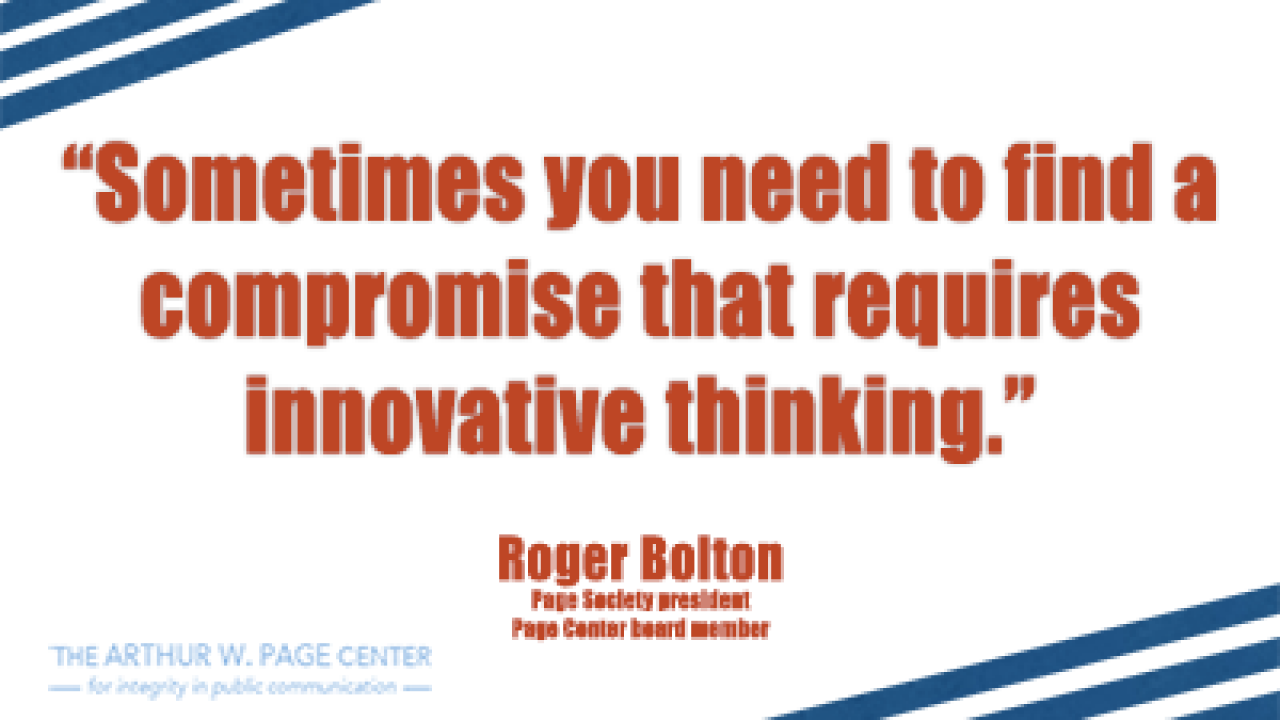May 02, 2018
Part 2: Q&A with Center board member Roger Bolton

Page Center intern Sarah Vlazny interviewed Arthur W. Page Society president and former Aetna senior vice president of communications Roger Bolton. This installment is the second of three blog posts covering Vlazny's discussion with Bolton, who is also a member of the Page Center advisory board. In the the current post, Bolton discusses the impact CEOs and corporations can have on current issues. Read post #1 here.
When considering the implications it could have for the various publics of the company (employees, shareholders, and the general public) how do CEOs balance the interests of these different groups?
That’s a very good question because whether its social activism or anything else you do-- pricing, supply or any of the millions of decisions you make when you run a business, you’re going to find that these publics differ. It’s very easy for us in communications to say we’re all about stakeholder engagement or listening to our stakeholders, but that ignores the very clear reality that on many issues our stakeholders’ interests are not aligned with each other.
Going back to my experience at Aetna for example, the doctors, the patients and the companies that fund the coverage all have different sets of interests. You have to balance all of those interests and ask "Is this going to be good for our shareholders? Our employees? Our customers? Our suppliers?" And you may get different answers. That’s what makes it so complicated. Sometimes you need to find a compromise that requires innovative thinking.
I’ll give you a good example of that. Sally Benjamin Young tells a great story. She works for Lundbeck, which is a Danish pharmaceutical company that has a big American presence. They make a pharmaceutical that is helpful for people with seizures. As it turned out, this pharmaceutical also has the ability to kill people if it’s used in certain doses. And so states that execute prisoners for capital crimes were purchasing this product and using it to put people to death. The company has a really strong pro-life stand and they don’t want their pharmaceutical to be used for this. The headquarters felt so strongly about this that they wanted to withdraw the product.
The problem with withdrawing the product is that it’s the only product available to doctors and hospitals that need it for life-saving purposes. So they had to think about how to meet these conflicting interests, and they came up with a brilliant middle-of-the-road strategy. They decided not to take it off the market, but to change their distribution model. Instead of distributing it to third parties that were then going to sell it, they decided to distribute it directly to the hospitals and doctors that they knew needed it. That way, they knew that it wasn’t going to be used for executions.
That story just illustrates the point of how you think of all your different stakeholders and all their different needs. Each problem is a separate problem and you have to weigh the pros and cons and see if there’s an innovative way to meet everyone’s needs.
Do you think the trend of CEO advocacy will continue until it’s impossible for CEOs to remain neutral? Or do you think this is already the case?
I think there’s increasing pressure, but I don’t think necessarily all companies feel the pressure. It depends on the issue and whether the company is directly involved or not. If you’re a small B2B company and you’re not involved in firearms or in a state where there’s a bathroom debate, there’s no pressure. If you don’t have a big consumer presence you might also not feel the pressure. It’s not so intense that every CEO has to be constantly worried about speaking out.
But I do think there is increasing expectation for businesses to act responsibly in the three ways that I described (See Part 1): corporate purpose, CSR, and advocacy on policy issues.
Do you think CEO and corporate advocacy makes a significant impact on public opinion or do you think it’s the other way around?
The study by Chatterji and Toffel suggests that CEOs do have influence on issues. And I think that’s demonstrably true, if you look at the bathroom example. You can affect policy and you can affect behavior if you take a stand in the right way at the right time. The right company, in the right way, at the right time can have an impact.
What impact do you think corporations and CEOs have on public policy and do you think they will shape public policy more in the future?
There’s an organization in Washington called the Business Roundtable. It’s a CEO membership organization that fundamentally exists to lobby public policy issues. Historically, those have been issues that directly relate to the issues that matter most to business, including economic policy, taxation, regulation, trade policy and the like. They are hugely influential.
The word lobbying has become a pejorative, which I think is unfortunate because petitioning the government is protected in the constitution of the United States. It’s critically important for all citizens—whether they’re organized in corporations, or individuals, or nonprofits—to have the opportunity to attempt to influence government. It should be done authentically and legally, and not with bribes but with data, arguments and persuasion.
Now, however, as we have been discussing, CEOs are increasingly speaking out on issues that don’t go to the heart of the economics of the business or regulatory affairs, but rather broader public policy issues. Forces are shaping that to be more prevalent than it has been in the past, and we can probably expect it to increase.
This is part two of a three-part Q&A with Roger Bolton. Read post #1 here, and check the Page Center blog this Friday, May 4 for the third and final post.
